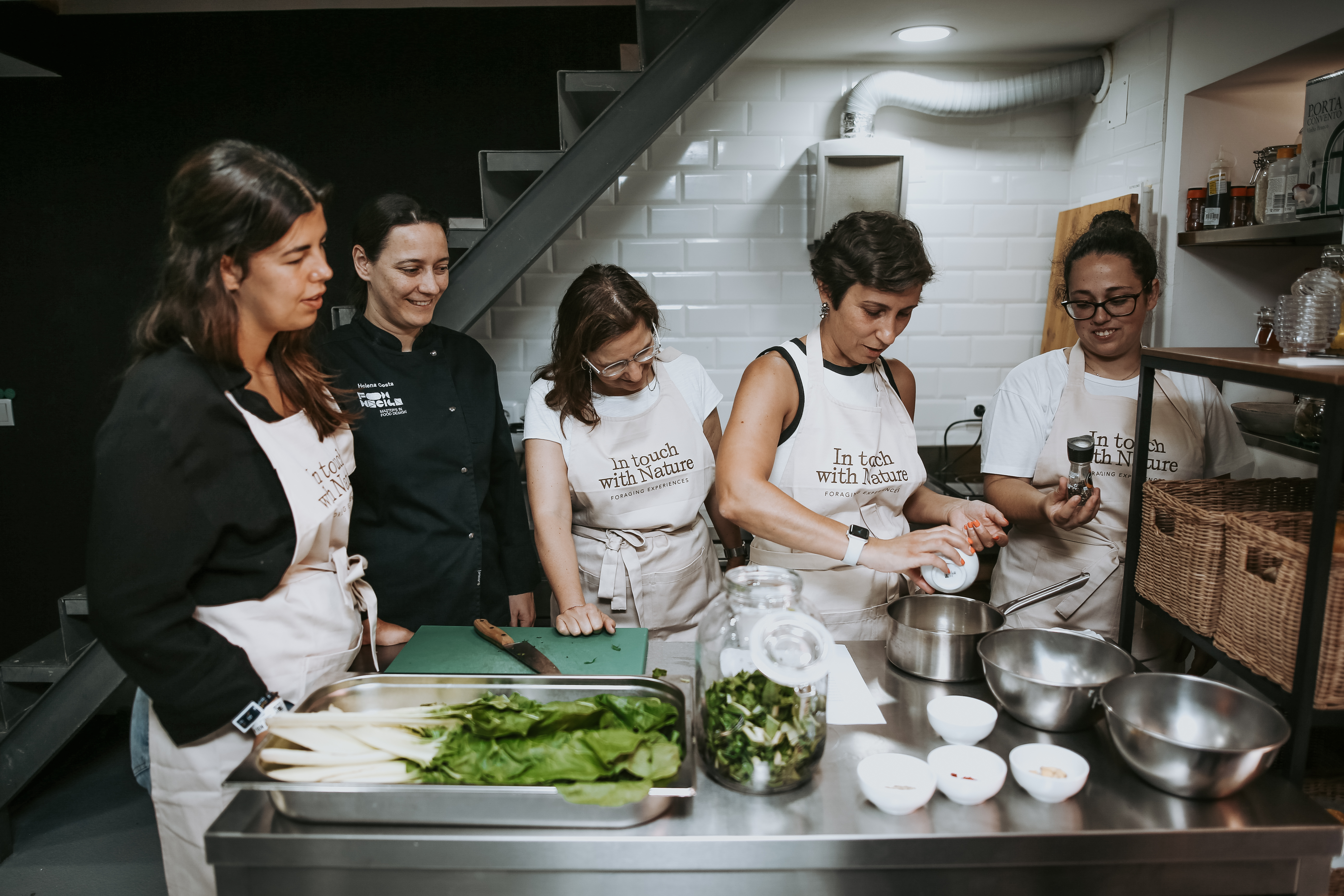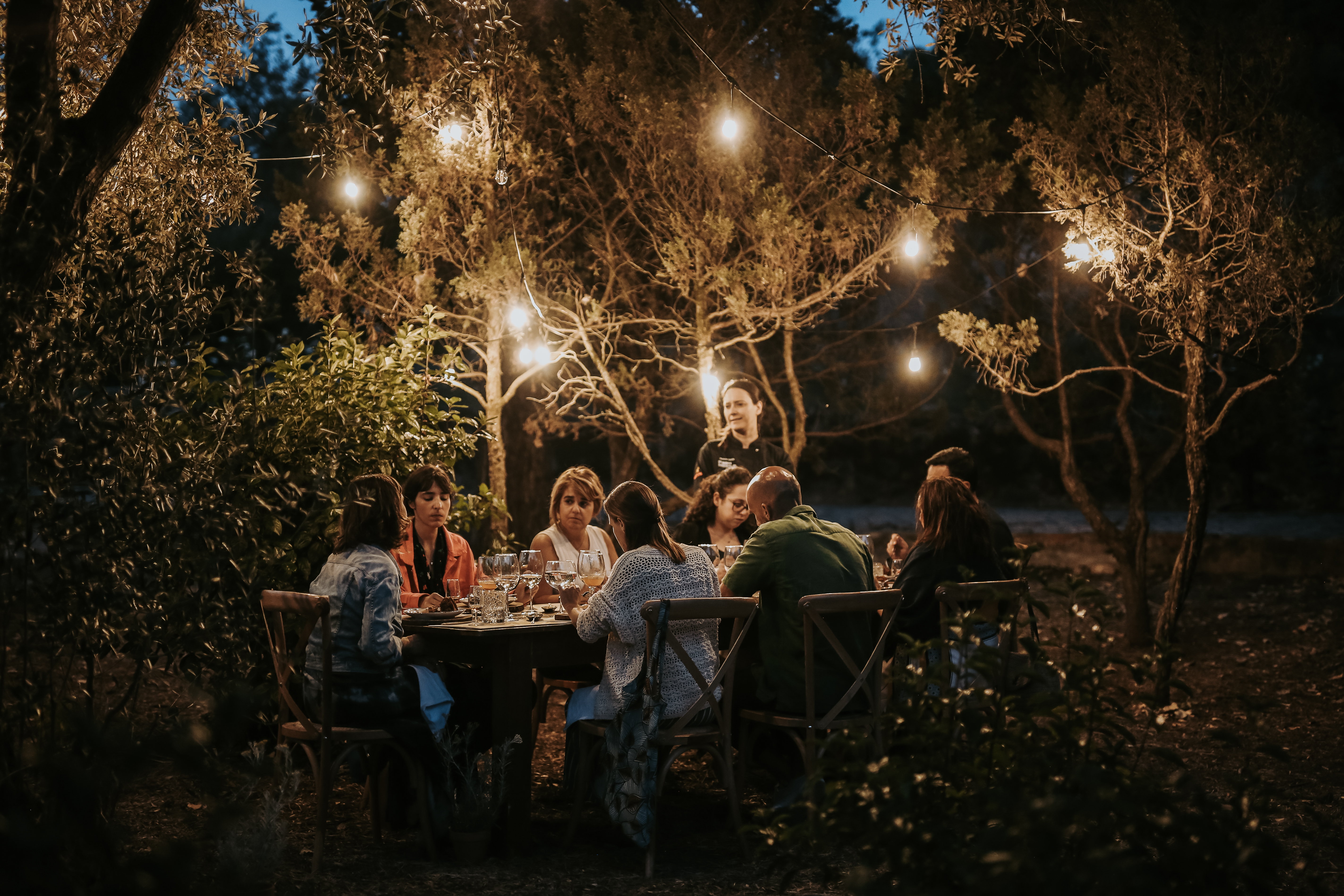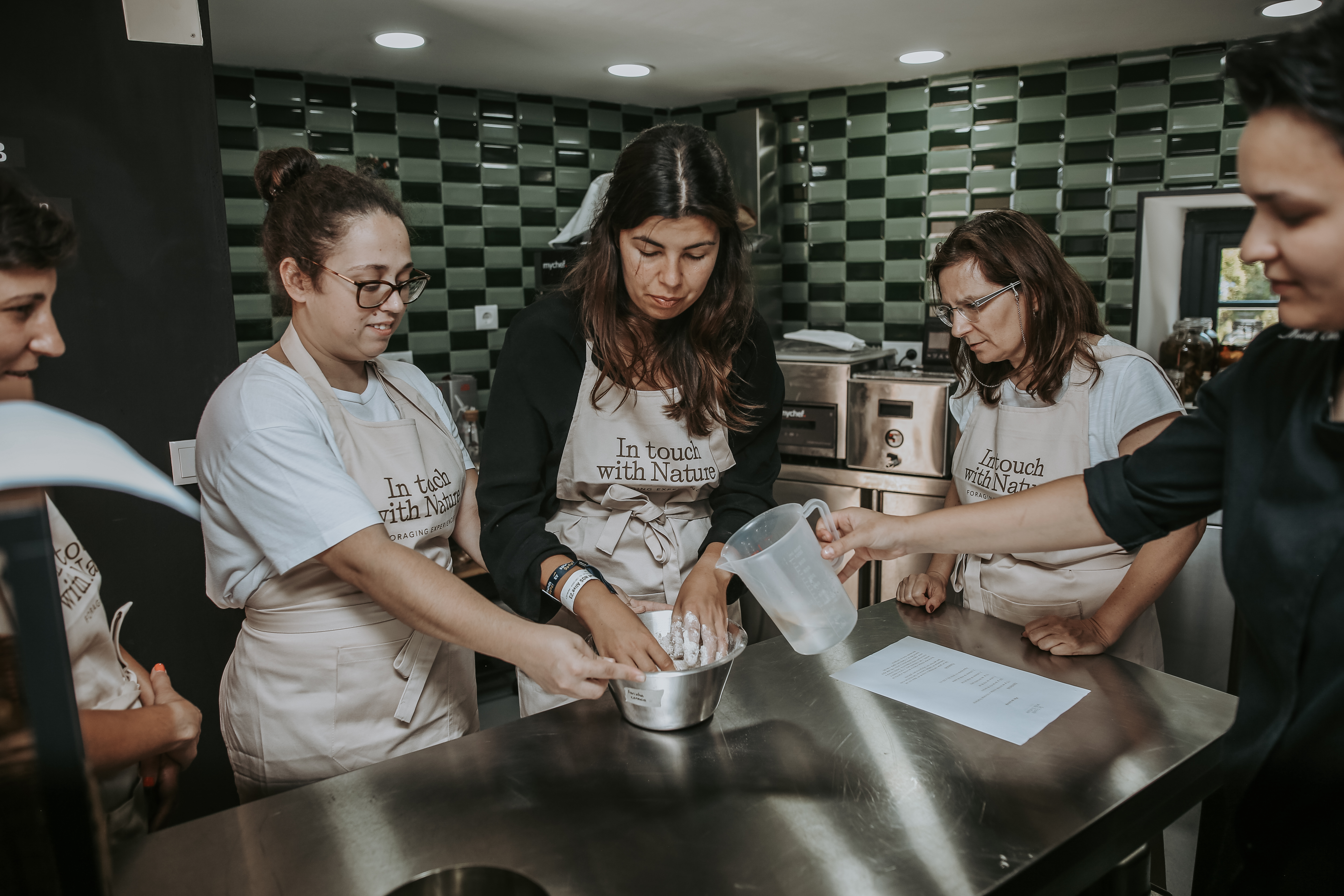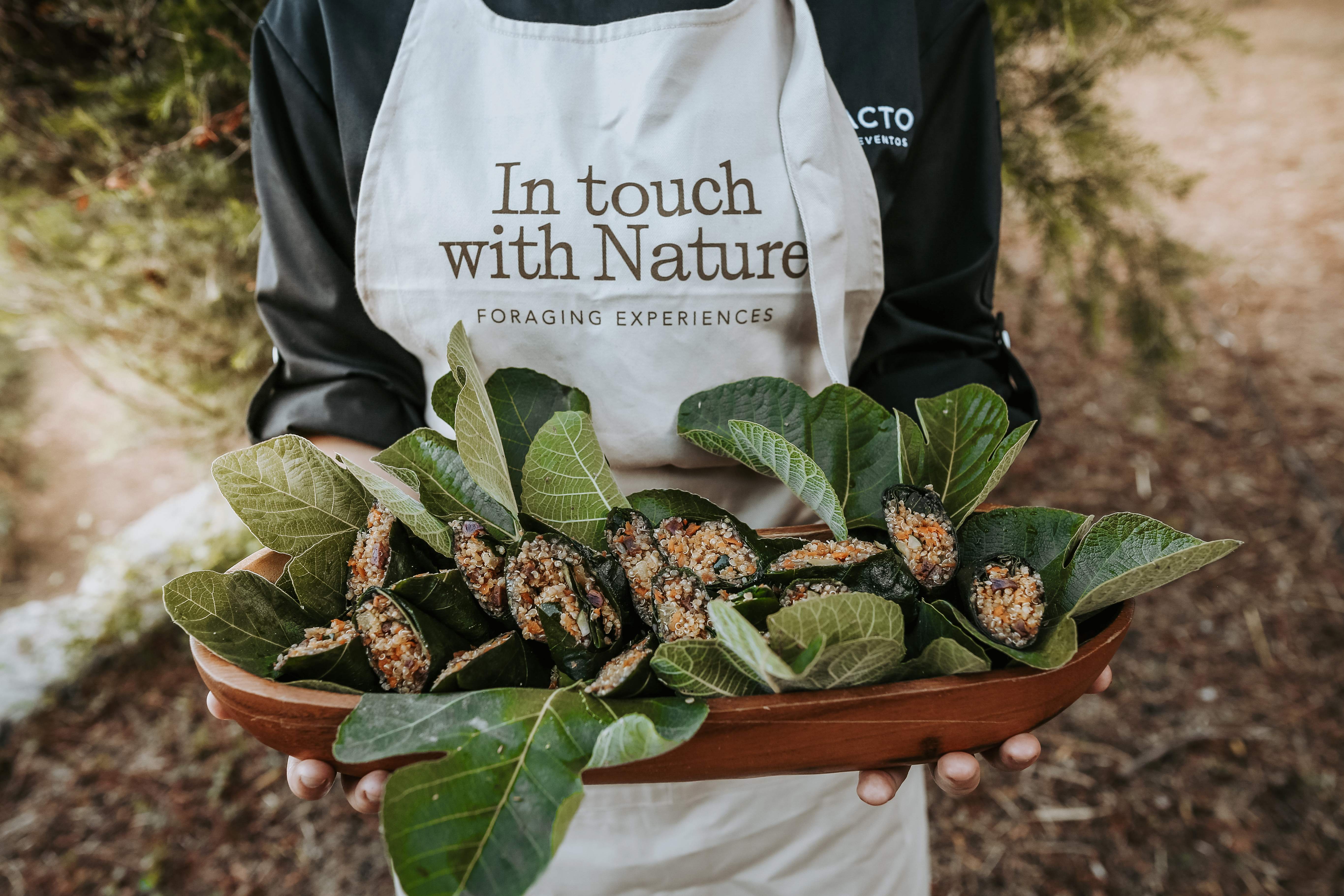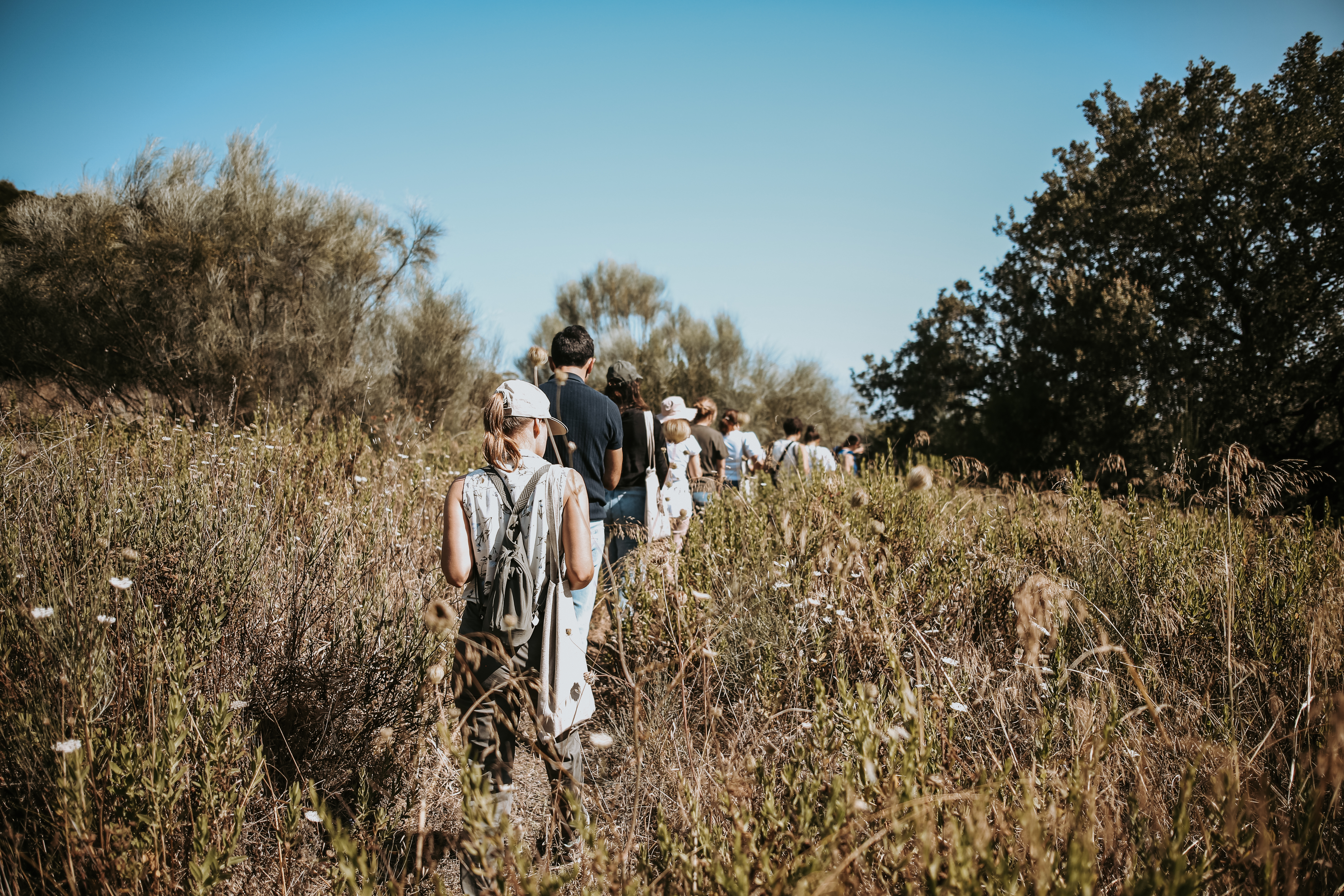Reconnecting with nature
In Touch with Nature
In Touch with Nature, Foraging Experiences
In Touch with Nature is a one-of-a-kind sensory foraging experience designed to reconnect urban residents with rural landscapes. Through immersive nature walks, culinary workshops, and wild gastronomy, participants discover the flavors, textures, and aromas of wild species. They learn sustainable practices while rediscovering the rhythms of nature and their role in a diverse food culture. This experience provides a meaningful escape that nourishes both the soul and the planet.
Portugal
Regional
Lisbon Area.
It addresses urban-rural linkages
It refers to other types of transformations (soft investment)
Yes
2024-05-30
No
No
No
As a representative of an organisation
In Touch with Nature offers a sensory foraging experience to reconnect urban dwellers with the environment through gastronomy. By integrating guided foraging walks, culinary workshops, and immersive tastings, participants explore wild species, rediscover forgotten flavors, and engage with sustainable food practices. Target audience: individuals seeking a break from urban routines, food enthusiasts, chefs, and professionals interested in biodiversity and sustainable gastronomy. Objectives: raise awareness of foraging as a means of reconnection, educate on wild edibles and their culinary potential, and promote a deeper relationship with nature through a multi-sensory approach. Outcomes: participants engaged in a meaningful, hands-on experience, learned about biodiversity and sustainable cooking, and acquired practical skills in using wild species for food preparation. The project encouraged curiosity, community dialogue, and a shift in perception toward more conscious eating habits.
Foraging
Sensorial
Reconnection
Sustainability
Gastronomy
In Touch with Nature promotes sustainability by reconnecting people with their food sources through foraging, which reduces reliance on industrial food systems. By educating participants about wild edibles and forgotten culinary traditions, the project fosters awareness of biodiversity and highlights the importance of seasonality, minimizing waste, and conserving natural resources. Key objectives include:
Environmental sustainability: Encouraging responsible foraging and preserving biodiversity.
Food literacy: Teaching sustainable culinary techniques such as fermentation and preservation.
Community engagement: Strengthening the connection between urban and rural environments.
The project has achieved these goals by offering immersive experiences that blend education with gastronomy, inspiring participants to rethink their food consumption and adopt more sustainable habits. By demonstrating that wild foods are valuable, accessible, and culturally significant, In Touch with Nature is an exemplary model for sustainable food education and experiential learning.
Environmental sustainability: Encouraging responsible foraging and preserving biodiversity.
Food literacy: Teaching sustainable culinary techniques such as fermentation and preservation.
Community engagement: Strengthening the connection between urban and rural environments.
The project has achieved these goals by offering immersive experiences that blend education with gastronomy, inspiring participants to rethink their food consumption and adopt more sustainable habits. By demonstrating that wild foods are valuable, accessible, and culturally significant, In Touch with Nature is an exemplary model for sustainable food education and experiential learning.
In Touch with Nature combines aesthetics, design, and cultural heritage to create a multi-sensory experience that reconnects people with nature. This project transforms wild food into a narrative of place, memory, and sustainability through carefully curated foraging walks, hands-on culinary workshops, and immersive dining. Key objectives include: Aesthetic experience: Creating visually and sensorially rich encounters, from the landscape to the table, which highlight nature’s raw beauty. Cultural enrichment: Reviving traditional knowledge of wild edibles to reconnect participants with food heritage. Holistic engagement: Encouraging mindful interaction with food through touch, taste, smell, and storytelling. These objectives have been achieved through thoughtful design choices, from handcrafted tableware to immersive settings that enhance the sensory journey. The project exemplifies how design can elevate food experiences beyond simple consumption, making them transformative, educational, and deeply connected to cultural identity.
In Touch with Nature is founded on principles of inclusion, ensuring accessibility, affordability, and participation for diverse groups. By crafting an experience that combines food, nature, and culture, the project nurtures a sense of belonging and connection to the environment, regardless of background or expertise. Key objectives include: Accessibility: The foraging experience occurs in green spaces adjacent to urban areas, making nature exploration attainable without extensive travel. Activities require no prior knowledge, allowing everyone to join in. Affordability: By emphasizing wild edibles, the project illustrates how sustainable food sources exist outside conventional food systems, promoting alternative, cost-effective nourishment. Community-building: The Jefferson Dinner format encourages open dialogue, fostering knowledge-sharing among experts, locals, and enthusiasts. Democratic food literacy: The experience empowers participants by equipping them with tools to recognize, harvest, and prepare wild foods, bridging gaps between urban and rural food cultures. In Touch with Nature’s inclusive, participatory approach exemplifies how design can create equitable, engaging experiences that democratize access to food knowledge while promoting environmental stewardship.
In Touch with Nature is deeply rooted in community participation, involving citizens and civil society meaningfully. The project unites chefs, designers, foraging experts, and urban dwellers to co-create an experience that redefines our relationship with food and nature. Citizen involvement: Active participation: Attendees participate in hands-on foraging, cooking, and knowledge-sharing, fostering a sense of ownership over food literacy and sustainability. Knowledge exchange: Local experts, including botanists and chefs, provide insights on wild edibles, bridging tradition and innovation. Community dialogue: The Jefferson Dinner format encourages participants to discuss what they have learned and shape ideas for sustainable food futures, amplifying diverse perspectives. This involvement enriches the project, transforming it into a collective learning experience rather than a passive event. It strengthens networks between urban communities and rural knowledge holders, fostering a lasting impact on food awareness, biodiversity appreciation, and sustainable habits. In Touch with Nature exemplifies how inclusive, citizen-driven initiatives can inspire deeper connections with the environment.
In Touch with Nature engages stakeholders at various levels—local, regional, national, and European—to create a comprehensive and impactful experience that connects food, sustainability, and culture. Stakeholder involvement: At the local level, urban residents, chefs, foraging experts, and community members actively engage in workshops, foraging walks, and discussions, promoting grassroots involvement and knowledge-sharing. Regional level: Collaborations with sustainable food initiatives, rural producers, and environmental organizations strengthen the connection between urban and rural food systems, ensuring responsible foraging practices and fostering biodiversity awareness. National level: Academic institutions and food design professionals contribute research, educational frameworks, and expertise in gastronomy, broadening the project’s knowledge base and influence. European level: Alignment with EU sustainability policies, food system strategies, and biodiversity initiatives enhances credibility and supports incorporation into larger conversations on food resilience and environmental responsibility. This multi-tiered collaboration boosts the project’s impact by ensuring diverse perspectives, expertise, and resources. The synergy between local actions and broader policy frameworks illustrates how design-driven food experiences can cultivate sustainability, inclusivity, and cultural preservation across different scales.
In Touch with Nature integrates multiple disciplines, creating a rich, interdisciplinary experience that blends design, gastronomy, ecology, and cultural heritage. The project fosters collaboration among experts in food design, foraging, sustainability, and education, ensuring a holistic approach to reconnecting people with nature through food. Key disciplines involved include: Food Design & Gastronomy: Chefs and designers explore wild edibles, developing innovative culinary techniques that revive traditional knowledge while introducing contemporary applications. Ecology & Foraging: Botanists and foraging experts guide sustainable harvesting practices, ensuring biodiversity conservation and responsible food sourcing. Social & Cultural Studies: Anthropologists and historians provide insights into the historical significance of foraging and its role in cultural identity. Sustainability & Circular Economy: Environmental specialists highlight the ecological benefits of foraging and local food systems, aligning with broader sustainability goals. This interdisciplinary exchange fosters creative solutions, deepens understanding, and ensures the project is both experiential and educational. By bridging expertise from different fields, In Touch with Nature exemplifies how food-centered initiatives can meaningfully and innovatively address environmental, cultural, and societal challenges.
In Touch with Nature distinguishes itself from conventional food and sustainability initiatives by combining sensory foraging, gastronomy, and cultural storytelling into a transformative experience. Unlike typical food education programs or nature walks, this project offers a multi-sensory, participatory journey that engages individuals as both observers and active contributors in a living, evolving food system. Innovative features include Foraging as a Sensory and Gastronomic Experience: Going beyond basic identification, the project incorporates touch, smell, taste, and storytelling, making wild edibles an inspiring and accessible facet of modern cuisine. Hands-On Culinary Literacy: Participants acquire sustainable food techniques like fermentation, distillation, and preservation, reviving ancestral knowledge while applying it to contemporary food culture. Immersive Food Dialogue: The Jefferson Dinner format transforms the experience into a platform for co-creating ideas and fostering meaningful discussions on sustainability, biodiversity, and food sovereignty. Urban-Rural Connection: Although foraging is often perceived as a rural activity, this project demonstrates that it can flourish in urban-adjacent landscapes, challenging preconceived notions of food sourcing and nature within city life. By integrating design, ecology, and gastronomy, In Touch with Nature redefines how individuals engage with food, making sustainability tangible, engaging, and profoundly personal. It presents a replicable model for reconnecting communities with their environment in an innovative, immersive manner.
In Touch with Nature adopts a design-driven, experiential approach that integrates foraging, gastronomy, and sustainability education. The methodology is grounded in hands-on participation, sensory engagement, and reflective dialogue, ensuring a transformative and lasting impact on participants. Methodological Approach: Experiential Learning – Participants partake in guided foraging walks, discovering wild edible species through touch, smell, and taste, fostering direct, embodied knowledge. Culinary Co-Creation – Workshops teach sustainable food techniques such as fermentation, distillation, and preservation, revitalizing traditional methods while emphasizing practical applications. Immersive Food Dialogue – The Jefferson Dinner format encourages participants to share their experiences, promoting a collaborative exchange on biodiversity, sustainability, and food culture. Interdisciplinary Integration – Experts in gastronomy, ecology, design, and anthropology contribute to a comprehensive learning experience, ensuring depth and diverse perspectives. Urban-Rural Connection – The project links city life with nature by demonstrating that foraging is accessible even in urban-adjacent areas, reshaping how people engage with food in their everyday lives. By blending sensory exploration, food literacy, and community dialogue, In Touch with Nature provides an innovative, replicable framework for sustainable food education, transforming ecological awareness into an interactive and inspiring experience.
In Touch with Nature is a scalable and adaptable model that can be replicated in various locations, tailored for different groups, and applied across multiple contexts. Its core elements—sensory foraging, culinary workshops, and immersive food dialogue—provide an accessible, transferable experience for diverse communities. Key Replicable Elements: Methodology & Learning Model – The experiential, multi-sensory approach to food literacy can be adjusted to different ecosystems, teaching individuals how to forage responsibly in their local environment. Foraging & Gastronomy Workshops – The hands-on culinary techniques (fermentation, preservation, and distillation) can be used with regional wild edibles, creating new ways to connect communities with their landscapes. Urban-Rural Food Connections – The concept of foraging in urban-adjacent green spaces can be duplicated in cities worldwide, reintroducing nature into daily life and food culture. Community Dialogue Format – The Jefferson Dinner model can be adapted to other social, environmental, and educational topics, fostering critical conversations across various cultural settings. Educational & Tourism Potential – The experience can be incorporated into school programs, sustainable tourism initiatives, and team-building events, broadening its reach and societal impact. By offering a modular and adaptable framework, In Touch with Nature serves as an innovative template for rethinking food education, sustainability practices, and sensory engagement with nature, making it a powerful tool for diverse communities around the globe.
In Touch with Nature addresses global challenges—biodiversity loss, resilience in food systems, urban disconnection from nature, and sustainability—by providing local, tangible solutions that empower communities to rethink their connection with food and the environment. Global Challenges & Local Solutions: Biodiversity Loss - Reviving Wild Edibles & Sustainable Foraging This project raises awareness about wild plant biodiversity and teaches participants to forage responsibly, ensuring species regeneration while rediscovering forgotten food traditions. Unsustainable Food Systems → Promoting Local, Seasonal Alternatives By highlighting wild edibles as nutritious and accessible food sources, the project reduces dependence on industrialized food chains and promotes low-impact, resilient eating habits. Urban Disconnection from Nature - Reconnecting Cities with Natural Foodscapes Foraging in urban-adjacent green spaces demonstrates that nature is not distant—it thrives within cities, fostering a sense of stewardship and reintegrating nature into daily life. Loss of Culinary Heritage - Reviving Ancestral Knowledge Through Food Design The project blends tradition with innovation, reviving fermentation, distillation, and preservation techniques that once defined sustainable food cultures. Lack of Food Literacy - Hands-on, Sensory Learning Rather than relying on theoretical education, In Touch with Nature immerses participants in tasting, touching, and engaging with nature, making sustainability a personal, lived experience. By offering local, replicable solutions, the project empowers communities to take small, meaningful steps toward a more sustainable, biodiverse, and conscious future, demonstrating how food can be a tool for global change, one meal at a time.
In Touch with Nature has achieved meaningful results in sustainability, food literacy, and community engagement, offering transformative experiences for both direct and indirect beneficiaries. Key Outcomes & Impacts: Direct Beneficiaries Participants (Urban Dwellers, Food Enthusiasts, and Professionals) Gained practical knowledge on wild edibles, foraging ethics, and sustainable food techniques. Engaged in sensory experiences that deepened their connection to food and nature. Developed new fermentation, distillation, and preservation skills, leading to greater self-sufficiency. Chefs & Food Industry Professionals Explored new ingredients and techniques, influencing sustainable menu development. Strengthened the link between gastronomy and biodiversity, promoting wild foods in contemporary cuisine. Indirect Beneficiaries Local Producers & Foraging Experts Increased awareness and demand for regional, seasonal ingredients, supporting local economies. Created opportunities for collaborations in sustainable food initiatives. Wider Community & Environmental Impact Raised public awareness of biodiversity conservation and the value of non-industrial food sources. Inspired urban dwellers to engage with nature, shifting consumption habits towards seasonal, low-impact foods. Provided a scalable model for integrating food sustainability education into schools, businesses, and tourism. Long-Term Impact Strengthened urban-rural connections, fostering a new appreciation for local ecosystems. Encouraged participants to adopt sustainable eating habits and share what they learned, multiplying the impact. Demonstrated how design, food, and culture can drive behavioral change toward sustainability. By merging education, experience, and engagement, In Touch with Nature has shifted perceptions, empowered communities, and set a replicable standard for sustainable food practices.

